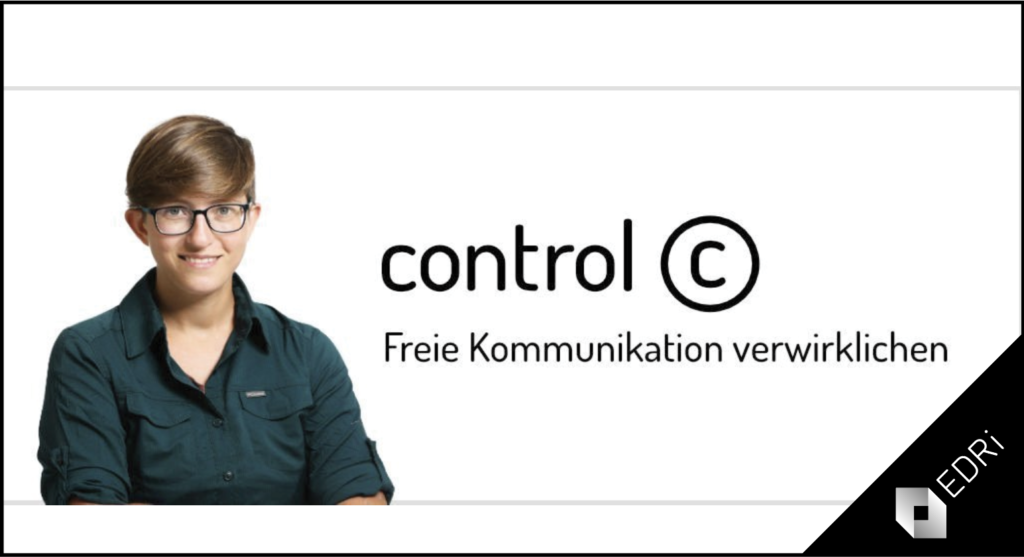Control ©: defending free online communication through litigation
Former Member of the European Parliament Felix Reda has joined the EDRi member German Gesellschaft für Freiheitsrechte (GFF, Society for Civil Rights). The copyright reform activist will coordinate control ©, a new project to defend freedom of communication.
Former Member of the European Parliament Felix Reda has joined the EDRi member German Gesellschaft für Freiheitsrechte (GFF, Society for Civil Rights). The copyright reform activist will coordinate control ©, a new project to defend freedom of communication. Control © will explore the friction between copyright law and fundamental rights such as freedom of expression, freedom of the press, ban on censorship and others. It will operate as a strategic legal guardian, bringing strategic copyright cases to court and ensuring that fundamental rights considerations are at the forefront of those cases.
Last year, Germany was on of the key focal points of protests against the European directive on copyright and related rights in the Digital Single Market (DSM Directive). A strong civil society movement, including EDRi and its members, formed against the most controversial provisions, Article 15 on the neighboring right for press publishers and Article 17 (former Article 13 <https://saveyourinternet.eu/>) on liability of online content sharing service providers.

The then former MEP and copyright reform activist Felix Reda led the opposition against the DSM Directive within the European Parliament, pointing towards its likely incompatibility with the EU’s Charter of Fundamental rights. To date, it is still disputed whether the requirements of Article 17 can be met without the installation of upload filters. Upload filters restrict free communication, because they invariably lead to the blocking of legal uses under copyright exceptions such as citations. Platforms that fail to cooperate with rightsholders to block the uploads of infringing content can be held liable for copyright infringements by their users.
The German government promised to avoid the introduction of upload filters as they would restrict free online communication to a critical degree, possibly violating freedoms guaranteed by the German basic law. This concerns the right to freedom of opinion and freedom of information and, depending on the functioning of these filters, the rights to data protection and confidentiality of communications.
Securing fundamental rights in copyright through strategic litigation
Whichever approach will be taken by Germany and other EU member states, the DSM Directive will expose existing problems and cause new ones between copyright law and fundamental rights. Government solutions to these problems are likely to benefit large right holders (music companies, film industry), neglecting the rights of users such as scientists, teachers, activists and also of small copyright holders and authors.
Thus, control © will use strategic litigation to fight for an implementation of the DSM Directive that is in
conformity with European and German fundamental rights. Strategic litigation has proven an invaluable tool to combat fundamental rights violations in the digital era. Since 2016, GFF has gone to court to defend civil rights in the face of mass-surveillance, excessive secret service powers or opaque state authorities. Control © will make use of this strategic tool in yet another area of law, profiting from GFF’s and Felix Reda’s combined expertise.
Beyond upload filters: cultural heritage and freedom of science
Beyond upload filters, there are more open questions regarding the interplay of copyright law and fundamental rights. The copyright Directive introduces new rules on digitizing making out-of-print works available. This holds the chance to unlock a huge treasure of pictures, music, poems and other works that are no longer in
commercial use. We will help institutions such as libraries, museums and archives to make use of these new opportunities in order to strengthen freedom of culture, science and information.
Finally, academic freedom requires the circulation of knowledge as well as legal certainty. Too often, authors of scientific publications are being forced to cede the rights to their studies to commercial scientific publishers. The paywalls they install impede the access to knowledge and scientific progress. Strategic litigation in this field aims to clarify the regulations around Open Access publishing in order to make this option more feasible for more scientists.
Read more:
Introducing control © – Strategic Litigation for Free Communication (13.04.2020)
http://copyrightblog.kluweriplaw.com/2020/04/13/introducing-control-strategic-litigation-for-free-communication/
Control ©: Copyright and freedom of communication (in German only) (13.04.2020)
https://freiheitsrechte.org/urheberrecht/
About GFF (English)
https://freiheitsrechte.org/english/
(Contribution by Luisa Podsadny, from EDRi member GFF)
